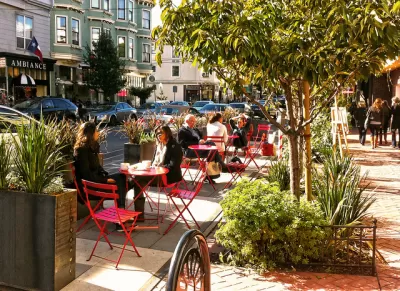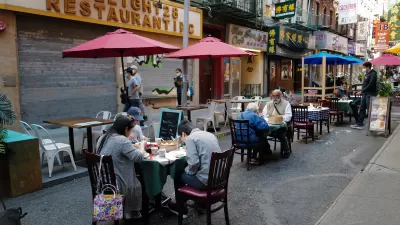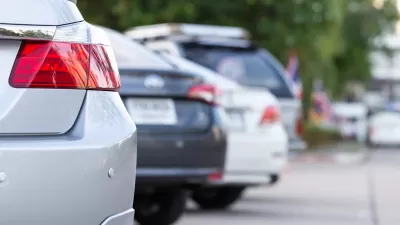Small-scale interventions can lead the way to major parking reforms.

Is your community ready for Parking Season?
For over a decade, urban activists around the world have celebrated Park(ing) Day on September 20, marking a day when urbanists demonstrate new uses for parking spots and take the opportunity to propose more effective parking policies.
As Carlee Alm-LaBar explains in a piece for Strong Towns, “One powerful way for cities to increase their resilience and productivity is to abolish parking minimums. For local heroes, embracing this challenge often involves taking small steps before reaching the final goal.” This year more than ever, the movement toward parking reform is growing in small and big cities alike.
Alm-LaBar uses an example from Lafayette, Louisiana to illustrate how temporary, low-cost installations can lead to permanent change. “The city worked with a nonprofit organization — ReCover Acadiana (now Civicside) — to host Park(ing) Day in 2017. That first year, it had 16 temporary installations in Downtown Lafayette. They were works of architecture, museum-inspired installations, a temporary fountain and a simple installation that foreshadowed enjoying a dining experience outdoors.” Less than a year later, the city began permitting parklets and outdoor dining spaces in former parking spots.
FULL STORY: How To Use Parking Season To Make Your Community Stronger

Trump Administration Could Effectively End Housing Voucher Program
Federal officials are eyeing major cuts to the Section 8 program that helps millions of low-income households pay rent.

Planetizen Federal Action Tracker
A weekly monitor of how Trump’s orders and actions are impacting planners and planning in America.

Ken Jennings Launches Transit Web Series
The Jeopardy champ wants you to ride public transit.

Rebuilding Smarter: How LA County Is Guiding Fire-Ravaged Communities Toward Resilience
Los Angeles County is leading a coordinated effort to help fire-impacted communities rebuild with resilience by providing recovery resources, promoting fire-wise design, and aligning reconstruction with broader sustainability and climate goals.

When Borders Blur: Regional Collaboration in Action
As regional challenges outgrow city boundaries, “When Borders Blur” explores how cross-jurisdictional collaboration can drive smarter, more resilient urban planning, sharing real-world lessons from thriving partnerships across North America.

Philadelphia Is Expanding its Network of Roundabouts
Roundabouts are widely shown to decrease traffic speed, reduce congestion, and improve efficiency.
Urban Design for Planners 1: Software Tools
This six-course series explores essential urban design concepts using open source software and equips planners with the tools they need to participate fully in the urban design process.
Planning for Universal Design
Learn the tools for implementing Universal Design in planning regulations.
Ada County Highway District
Clanton & Associates, Inc.
Jessamine County Fiscal Court
Institute for Housing and Urban Development Studies (IHS)
City of Grandview
Harvard GSD Executive Education
Toledo-Lucas County Plan Commissions
Salt Lake City
NYU Wagner Graduate School of Public Service





























